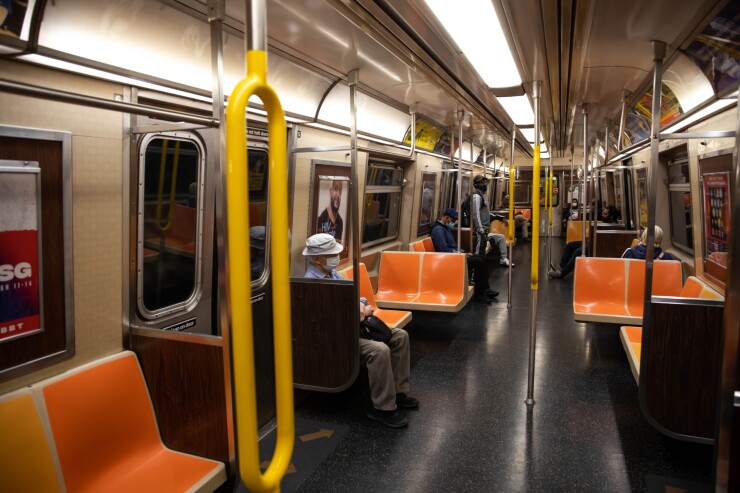The pension plans for New York’s Metropolitan Transportation Authority are suing fund manager Allianz Global Investors in federal court, claiming risky investments “decimated” their balances when COVID-19 struck.
These MTA plaintiffs lost 97.3% of the value of their investments between Dec. 31 and their final redemptions on April 23, according to a complaint filed Sept. 23 in the U.S. District Court for the Southern District of New York in Manhattan.
That left the funds with just over $9 million, according to the complaint.
The plaintiffs are the Metropolitan Transportation Authority Defined Benefit Pension Plan Master Trust; the Manhattan and Bronx Surface Transit Operating Authority Master Plan; and the MTA’s Other Postemployment Benefit Plan.

Lawsuits by the MTA and other pension funds claim investors lost roughly $4 billion overall, Reuters reported, citing complaints by pension funds for the Teamsters labor union, Arkansas teachers and Blue Cross and Blue Shield.
“The MTA is aggressively pursuing full damages from Allianz for breach of duties as they failed to properly hedge against the market crash as contractually required,” authority spokesman Aaron Donovan said. “To be clear, no employees will be affected as these MTA plans are defined benefit and as a result employee pensions are not at risk.”
Bleichmar Fonit & Auld LLP and Calcaterra Pollack LLP are the representing the plaintiffs. Sullivan & Cromwell LLP is representing Allianz.
Judge Katherine Polk Failla is presiding. Failla has scheduled a pretrial conference for 11 a.m. Nov. 17 in Courtroom 618 of the Thurgood Marshall Courthouse in New York.
Public pension funds are increasingly wary of risky investments, with some states choosing passive investment strategies. The board of the
“It’s time that more pension funds wake up to the fact that Wall Street has, in many cases, sold them something close to modern-day snake oil,” state Treasurer Joe Torsella said.
In Rhode Island, state Treasurer Seth Magaziner launched a
Allianz, according to court documents, invested heavily in a Structured Alpha family of funds, “designed and marketed as responses to market crashes like the one in 2008.”
But as the markets began to roil, Allianz increased the risky bets.
“AllianzGI’s negligent and imprudent trading strategies were only part of the problem; it’s failure to implement adequate risk management procedures, despite its commitment to doing so, was another part,” the lawsuit said. “AllianzGI failed to perform adequate stress testing [or at a minimum, it failed to heed the results of its stress testing], which should have identified the unreasonable levels of risk on its books.
“As it turned out, AllianzGI’s negligent and imprudent bet proved to be disastrous. Not only did the market fail to normalize, it continued its free-fall.”
Allianz, in a statement to several media outlets, said it plans to defend itself against the “legally and factually flawed” allegations.
“The claimants are professional investors, most of whom were advised by a sophisticated investment consultant to evaluate the Structured Alpha strategy,” a press officer said in the statement. “The MTA determined that the Structured Alpha Portfolio fit with their overall investment goals and risk tolerances.”
The state-run MTA, one of the largest municipal bond issuers with $346 billion of debt including special credits, operates New York City’s subways and buses, two commuter rail lines and several interborough bridges and tunnels.
Shutdowns and stay-at-home mandates to combat the coronavirus since March have dealt a massive blow to the MTA’s finances. The authority is seeking $12 billion in federal rescue aid, having used its entire $3.9 billion under the federal CARES Act, passed in March.
MTA officials are already weighing further use of the Federal Reserve’s Municipal Liquidity Facility short-term borrowing program. Only the MTA and Illinois, the lowest-rated state, have used the program.
The MTA in August sold $450 million of transportation revenue bond anticipation notes to the Fed at 1.93%, after rejecting bids from banks in the open market.
MTA officials can access a further $2.9 billion under the MLF.





